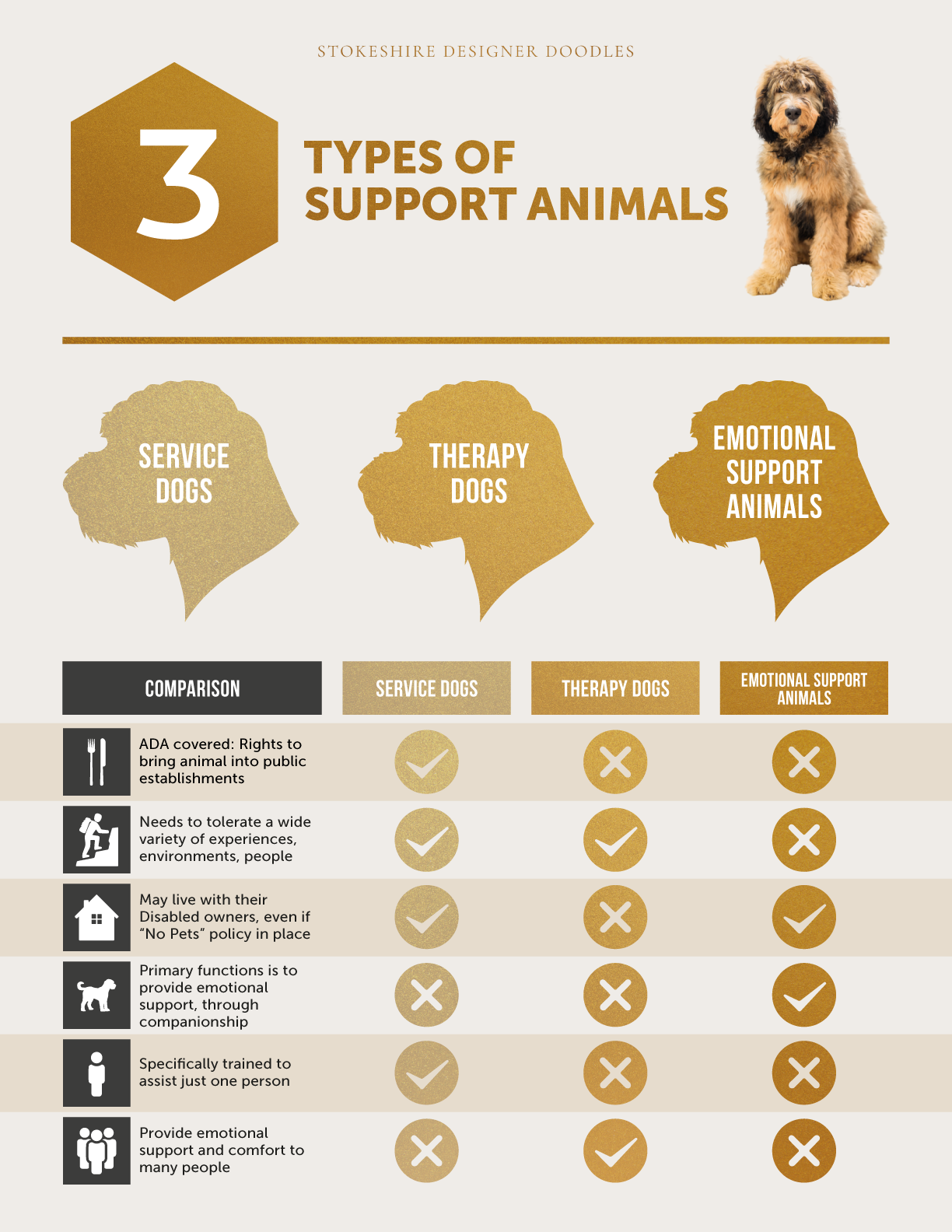How do I get an emotional support doodle?
Conditions that may qualify you for an emotional support animal.
post-traumatic stress disorder (PTSD)
anxiety
depression
fear/phobias
panic disorder/panic attacks
mood disorders
personality disorders
seasonal affective disorder
social anxiety disorder
What is an Emotional Support Animal?
An Emotional Support Doodle is a dog that a licensed mental health professional (LMHP) has determined provides some benefit to an individual with a mental or emotional disability. They do not require specific training and provide emotional or mental stability to their owner through their love and companionship. Emotional Support Dogs are also commonly called Companion Dogs or Assistance Animals. They are not, however, considered service dogs. Nonetheless, Emotional Support Dogs are still entitled to certain rights where it concerns air travel and housing.
“An emotional support animal prescription is your ESA letter AND a certification of your emotional support animal registration.”
How to Get a Legitimate Emotional Support Animal (or ESA Letter)
Legitimate ESA letters will always be on professional letterhead. They will have a genuine signature from your licensed mental health professional or physician. It needs to include the professionals' contact details and the address of their practice. As well, there should be confirmation that you are currently under their care. It must also include:
Proof that you suffer from a mental health condition listed in the Diagnostic and Statistical Manual of Mental Disorders, edition 4 or 5
Confirmation that this condition prevents you from undertaking a significant life activity, such as going to work, socializing or being in public spaces
A statement from the professional that they deem your Emotional Support Animal to be a necessary part of your treatment and mental health support
Emotional support might include if the animal:
Lowers your stress levels when out in public
Calms you down if you suffer from panic attacks
Helps you deal with social situations
What Laws Do ESA Owners Need to Know?
Housing Laws
According to the Fair Housing Act (FHA), landlords cannot legally deny you from renting an apartment or house because of your Emotional Support Animal (ESA), as long as you have appropriate ESA documentation.
This protection holds even if they operate a 'no pets' policy. ESAs have additional rights and do not fall under the same legal class as pets. Landlords also cannot ask you to pay additional fees to live with your animal.
Although landlords may ask to see your ESA letter, they cannot ask—under any circumstances—any medical questions or enquire as to the personal nature of your disability.
The US Department of Housing and Urban Development (HUD) investigates claims of housing discrimination. It explicitly forbids housing providers from asking their applicants or tenants to disclose detailed information about their physical or mental impairments. Providers also cannot demand the applicants share access to their private medical records or medical providers.
Airline Laws
As of February 2020, under Federal laws, airline staff cannot deny ESA owners and their pets "reasonable access" to flight accommodation. The Air Carrier Access Act (ACAA) of 1986 gives owners the right to travel on commercial airlines with their well-behaved animals accompanying them in the aircraft cabin.
It's worth noting that various airlines place restrictions on the size of the Emotional Support Animals that they allow in the cabin. American Airlines, United, Delta, Southwest, and JetBlue state that animals must not block the aisles. WestJet Air explicitly allows miniature horses, large emotional support dogs, and even pigs!
It's always a good idea to contact your airline well in advance if you plan to travel with your Emotional Support Animal. Many airlines now ask for a 'reasonable accommodation' form signed by a therapist, in addition to the ESA letter.
Workplace and Education Laws
The law also states that Emotional Support Animals can join their owners in their place of work or education, including non-pet-friendly college dorms or houses. This exception is because it's illegal for employers or schools to discriminate against their staff or pupils if they have a disability.


